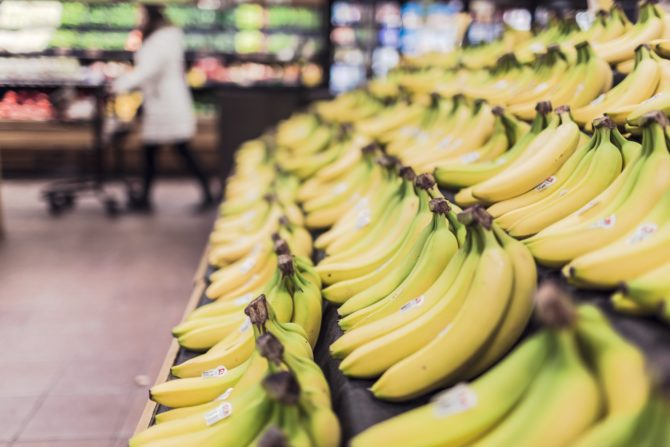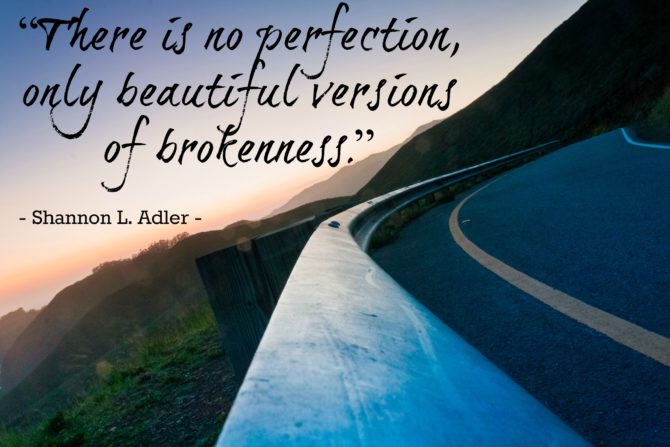I was walking through Costco last week when I saw her: she was impeccably dressed, in a fitted pencil skirt and ironed blouse more suited to a day in the office than a morning spent running errands. The items in her cart were neatly stacked, each one strategically placed to make room for all of the organic produce filling her basket. This woman clearly had her act together. She was the PERFECT woman.

As Mrs. Perfect and I exchanged polite smiles from across the aisle, I couldn’t help but feel self conscious. I glanced down at my own mismatched gym clothes, which were predictably stained with toddler food and possibly worse. My eyes moved to the hodgepodge of processed foods I’d haphazardly tossed into my shopping cart; how was it already such a disaster zone after only five minutes in the store? The child whining at me from his seat in the cart did nothing to improve my image. I was the epitome of a HOT MESS: in every way possible, I was this perfect woman’s antithesis.
Though I’m sure my reverse doppelgänger barely registered my presence, our brief interaction catapulted me into a pool of shame. I call myself a perfectionist, and yet I could barely get my act together for a routine trip to Costco. Aren’t perfectionists supposed to be a bit more “perfect?” I spend so much time striving after that elusive goal. At the very least, I should be granted the privilege of looking the part. But here I was, falling short once again.
I hadn’t even reached the check-out line before I recognized the absurdity of my thought process. Being a perfectionist isn’t about being perfect, or even giving that appearance. The possibility of achieving that ideal is chief among Perfectionism’s lies. But his voice was a broken record in my mind, and I was a glutton for punishment, refusing to mute his vicious narration.
Perfectionism has been my personal Achilles heel for as long as I can remember. I wage an ongoing battle against this nemesis (as well as his co-conspirators of OCD, anorexia, and depression), and while I write about this struggle with some frequency here on the blog, it’s not something I discuss very often in real life. It’s easy for me to feel alone in my struggle, which is why I find it refreshing to read of others’ Perfectionism Wars.

I came across one such story a while ago on One Little Momma. After a frustrating day with her FOUR sons, Kylie found herself lamenting to her husband: “Why does God make us this way? Why do women crave order and cleanliness and organization and pretty things?!? But we also love babies and kids and those two things cannot coexist together! We’re just doomed for frustration!!!”
I’m continually asking similar questions: Why do I seek perfection when it is so obviously unattainable? And why has God given me this lifelong struggle against an enemy I can never defeat? The conclusions I keep coming back to are very much like the answers Kylie received:
“I was given that hope for perfect, orderly, pretty things because they are Godly. God is perfect and He wants us to have those things. But He also made me to be a mother and He wants me to raise messy little things and that means living in a mess. Humbly. I learned that He wants me to lean on Him all day long, even when I have so many blessings and so many good things, He needs me to need Him.”
It’s popular in Christian communities to claim that God won’t give us anything we can’t handle, but the opposite is true. God intentionally allows us to experience challenges that we are powerless to tackle on our own, because these trials draw us ever closer to Him.
I have been reading about the Enneagram, a personality model that categorizes individuals according to their dominate ego fixation. In The Enneagram: A Christian Perspective, authors Richard Rohr and Andreas Ebert call these fixations our root sins, and as a Type 1, mine is (unsurprisingly) a desire for perfection. It can be painful to admit this quality is a sin, but Rohr reminds me that “we must accept our sin in order to recognize how gifted we are.”
My perfectionism is an arrow, pointing me to God’s grace and binding me to His strength. This indomitable adversary leads to excruciating suffering, but also to desperate prayer as I realize that my salvation and transformation depend completely on God.
My life will never be perfect. I will never be perfect. And I probably will never succeed in relinquishing that desire. But rather than wallowing in self pity, I choose to be thankful for a BIG PICTURE God who loves me so much that He allows me to struggle, then meets me in my darkest moments and offers Himself as my answer.

Maybe you struggle with perfectionism, too. Or maybe your chief battle is with an demon of a different sort. The Enemy takes many forms, but The Solution is always the same. How are you choosing to rely upon Him today?